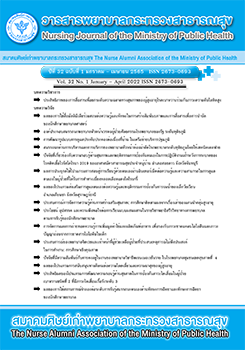Effective Communication to Enhance Health Literacy in The Diabetic Older Adults with High Blood Pressure
Main Article Content
Abstract
The older adults were the group with the highest prevalence of diabetes, especially those with hypertension as a co-morbid. If there is insufficient level of health literacy, that will result in increased mortality rate from cardiovascular disease. A study on the effect of verbal communication in patients with sufficiency level of health literacy found that there was a positive effect on self-care and health outcomes that could reduce blood sugar levels. In addition, the health care provider communicated with the elderly with diabetes and hypertension had no positive health outcomes because there were factors associated with the developmental deterioration at different ages and differently perceived experiences of health. These factors caused the information to be misleading from reality. The developing of communication methods for accessibility, understand, and put health information into practice comprised 3 levels: 1) the basic level is reading and writing: 2) the interaction level is asking questions about things that are not understood and telling others to understand: 3) the judgment level is to decide on reliable health information and use it to manage their own health. Therefore, the communication method for developing level of health literacy included 3 steps: 1) Build relationships and be open to information 2) Raise awareness of health care and 3) Build motivation for changing behavior decisions. There were various communication techniques in each step, such as including using the patients’ achievement experiences, giving health information by using narratives as a presentation technique, stimulating both positive and negative emotions, feedback technique, and communication through application Line or Facebook. These communication techniques could encourage health care providers to communicate more effectively and improved the level of health literacy for diabetic older adults with hypertension for resulting in positive health outcomes.
Article Details

This work is licensed under a Creative Commons Attribution-NonCommercial-NoDerivatives 4.0 International License.
บทความและรายงานวิจัยในวารสารพยาบาลกระทรวงสาธารณสุข เป็นความคิดเห็นของ ผู้เขียน มิใช่ของคณะผู้จัดทำ และมิใช่ความรับผิดชอบของสมาคมศิษย์เก่าพยาบาลกระทรวงสาธารณสุข ซึ่งสามารถนำไปอ้างอิงได้
References
Aekplakor W. Report of the survey of the Thai people by physical examination 5th, 2014. Nonthaburi: Health System Research Institute (HSRI).(in Thai).
Lee E.-H, Lee, YW, Lee K.-W, Nam M, Kim SH. A new comprehensive diabetes health literacy scale: Development and psychometric evaluation. Int J Nurs Stud.2018;88:1–8. https://doi.org/10.1016/j. ijnurstu.2018.08.002
Saeed H, Saleem Z, Naeem R, Shahzadi I, Islam M. Impact of health literacy on diabetes outcomes: a cross-sectional study from Lahore, Pakistan. Public Health.2018;156:8-14.
Sinthuchai S, Kittiboonthawal P, Dejpitaksirikul S, Chuencham J, Ubolwan K, Pragodpol P. Development of a health literacy model to enhance self-management behaviors and health outcomes among older adults with coexisting type 2 diabetes mellitus and hypertension in primary care cluster Saraburi province. [Internet].2021. [cited 2021 October10]. Available from: https://kb.hsri.or.th/dspace/handle/11228/5384.(in Thai).
Hong YR, Jo A, Cardel M, Huo J, Mainous AG. Patient-provider communication with teachback, patient-centered diabetes care, and diabetes care education. Patient Educ Couns 2020;103:2443–50.
Inoue M, Takahashi M, Kai I. Impact of communicative and critical health literacy on understanding of diabetes care and self-efficacy in diabetes management: across-sectional study of primary care in Japan. BMC Fam Pract 2013;14:40.
Tahmasebi R, Noroozi A, Tavafian SS. Determinants of self-management among diabetic patients: A path analysis. Asia Pac J Public Health 2013;27(2), NP524-34.doi:10.1177=1010539513475652
Boonsatean W, Reantippayasakul O. Health literacy: situation and impacts on health status of older adults. APHEIT.2020;2(1):1-9.(in Thai).
Kim SH, Lee A.Health-literacy-sensitive diabetes self-management interventions: A systematic review and meta-analysis. Worldviews Evid Based Nurs 2016;13(4):324–33.
Kaewdamkereng K. Health literacy: basic, interaction, critical. Bangkok: Amarin Printing;2019.(in Thai).
Tachavijitjaru C. Health literacy: a key indicator towards good health behavior and health outcomes. Journal of the Royal Thai Army Nurses 2018;19 Suppl 1:1-11.
Sørensen K, Van den Broucke S, Fullam J, Doyle G, Pelikan J, Slonska Z, et al. Health literacy and public health: A systematic review and integration of definitions and models. BMC Public Health. 2012;12:80.
Dunn P, Conard S. Improving health literacy in patients with chronic conditions: A call to action. Int J Cardiol 2018;273:249–51.
Malcolm S. Ageism and age discrimination. In: M. Sargeant, editor. Age discrimination and diversity: multiple discrimination from an age perspective. Cambridge: Cambridge University Press;2011.
Nurash P, Intarakamhang U, Kasevayuth K. Effect of teaching program on oral health literacy and patient centered communication promotion. Journal of Behavioral Science for Development.2019;11(1):71-90.(in Thai).
Hammar LM, Holmstrom IK, Skoglund K, Meranius MS, Sundle AJ. The care of and communication with older people from the perspective of student nurses. A mixed method study. Nurse Educ Today. 2017;52:1-6.doi.10.1016/j.nedt.2017.02.002.
Williams K, Kemper S, Hummert ML. Enhancing communication with older adults: overcoming elderspeak. J Gerontol Nurs.2004;30:17-25.doi:10.3928/0098-9134-20041001-08.
Miller WR, Rollnick S. Motivational interview helping people change. 3rd Ed. London:
Nutbeam D. Health literacy as a public goal: a challenge for contemporary health education and communication
strategies into the 21st century. Health Promote Int.2000;15(3):259-67.
Nutbeem D. The evolving concept of health literacy. Soc Sci Med.2008;67:2072-8.

